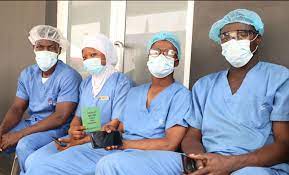Dr. Solomon Olaoye, Chairman of the Association of Medical and Dental Officers (AMDO), Oyo State chapter, has confirmed that the association’s members are not participating in the ongoing health workers’ strike in the state. Olaoye made this statement in an interview with Pathway News on Tuesday in Ibadan.
According to the News Agency of Nigeria (NAN), members of the National Association of Nigeria Nurses and Midwives (NANNM) in Oyo State have been on an indefinite strike since May 21. The strike was declared by the state chairman, Dr. Samuel Adeyemi, following the state government’s refusal to address the demands of its members.
In a related development, the Medical and Health Workers’ Union of Nigeria (MHWUN) in the state embarked on a seven-day warning strike on Monday to press their demands. MHWUN is demanding that the new hazard allowance being paid to health workers in hospitals also be extended to other health workers not posted to hospitals.
Olaoye stated that medical and dental officers in the state did not join the ongoing strike because their union had no pending issues with the government. He noted that the government has been responsive to some of their recent requests.
“Again, the recent outbreak of cholera in neighboring states, especially Lagos, is a major reason we will not think of any confrontation at this time. Our association is also currently engaging the state government to domesticate the recently approved adjusted basic consolidated payment approved by the Federal Government. The association believes in the Gov. Seyi Makinde-led administration’s ability to provide the enabling environment for medical personnel to be productive,” Olaoye said.
While expressing solidarity with their partners in the health industry currently on strike, Olaoye pleaded with them to reconsider their stand and commence negotiations with the government in the interest of the people.
The AMDO chairman also called on the Oyo State Government to address the genuine requests of the unions through negotiation. “This call is necessary to avoid possible unpleasant consequences that may arise in the event of any cholera outbreak,” he said.








